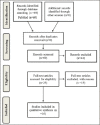Protein-Based Supplementation to Enhance Recovery in Team Sports: What is the Evidence?
- PMID: 31427875
- PMCID: PMC6683614
Protein-Based Supplementation to Enhance Recovery in Team Sports: What is the Evidence?
Abstract
Protein supplementation is a major nutritional practice among professional and amateur team-sport athletes representing a market of $5 billion in the USA alone. This practice, however, may not be supported by evidence-based science. Our objective as to present a thorough review of literature investigating the effects of protein supplementation on performance recovery and exercise-induced muscle damage following team-sport activity. PubMed-derived, full English language articles investigating the effects of protein-based supplementation/feeding on skeletal muscle performance, muscle damage and inflammatory status during recovery following team-sport activity were included. Studies investigated professional or amateur team-sport athletes participating in regular training and competition as well as examining the impact of protein supplementation on performance, muscle damage/soreness and inflammatory markers after team-sport activity. Finally, ten articles (150 participants) met the inclusion criteria. Experimental designs were evaluated for confounders. All protocols employing team-sport activity increased systemic muscle damage indicators and inflammatory markers and deteriorated performance during recovery. Protein-based supplementation attenuated the rise in muscle damage markers and enhanced performance recovery in six (60% of the studies included) and three (30% of the studies included) out of 10 studies, respectively. In contrast, immunity and muscle soreness remained unaffected by protein ingestion, independent of dosage and distribution pattern. In conclusion, there are limited and inconsistent data showing that protein supplementation may enhance performance recovery following team-sport activity despite an attenuation of indirect markers of muscle damage. Interpretation of results is limited by small sample sizes, high variability in tested supplements, participants' training level, length of recovery periods, absence of direct measurement of myofibrillar disruption, protein turnover and protein metabolism, and lack of dietary monitoring during experimentation.
Keywords: Nutrition; amino acids; anabolism; exercise performance; muscle damage; supplementation.
Figures
References
-
- Arent S.M., Pellegrino J.K., Williams C.A., Difabio D.A., Greenwood J.C. (2010) Nutritional supplementation, performance, and oxidative stress in college soccer players. Journal of Strength and Conditioning Research 24, 1117-1124. - PubMed
-
- Areta J.L., Burke L.M., Ross M.L., Camera D.M., West D.W., Broad E.M., Jeacocke N.A., Moore D.R., Stellingwerff T., Phillips S.M., Hawley J.A., Coffey V.G. (2013) Timing and distribution of protein ingestion during prolonged recovery from resistance exercise alters myofibrillar protein synthesis. Journal of Physiology 591, 2319-2331. - PMC - PubMed
-
- Betts J.A., Toone R.J., Stokes K.A., Thompson D. (2009) Systemic indices of skeletal muscle damage and recovery of muscle function after exercise: effect of combined carbohydrate-protein ingestion. Applied Physiology, Nutrition and Metabolism 34, 773-784. - PubMed
-
- Black K.E., Witard O.C., Baker D., Healey P., Lewis V., Tavares F., Christensen S., Pease T., Smith B. (2018) Adding omega-3 fatty acids to a protein-based supplement during pre-season training results in reduced muscle soreness and the better maintenance of explosive power in professional Rugby Union players. European Journal of Sport Science 18, 1357-1367. - PubMed
Publication types
MeSH terms
Substances
LinkOut - more resources
Full Text Sources
Medical
Miscellaneous

